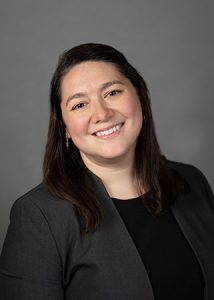Alicia Rea, 2L: Always in search of the next challenge
Ocean and Coastal Law Journal Editor-in-Chief
Youth Justice Fellow, Admissions Fellow

“My favorite kind of hobby is one that’s a lot of work,” Alicia Rea, a second-year law student, said. She’s only half kidding and her life before law school bears this out.
Rea attended undergraduate at Connecticut College, receiving a BA in Religious Studies, and then later received a second BA from Husson College in Psychology, followed by an MA in Public Administration and Policy from American University, all while working a full-time job at Bates College and serving two terms as a Lewiston City Councilor. Reciting her resume is enough to wind a person.
Believe it or not, Rea wasn’t drawn to Maine Law to round out her CV with yet another degree. During her time on city council, Rea also sat on the Lewiston School Committee, and it was during this time she became interested in issues of youth justice.
“I thought it was really important to have voices that represented not just the city’s interests but those of children as well,” Rea reflected.
As a 2L she now works in the Center for Youth Policy & Law with director Jill Ward who was appointed to The United States Department of Justice’s Office of Juvenile Justice and Delinquency Prevention as a senior policy advisor in 2023.
“It’s just incredible to be able to work with someone with that kind of national standing,” Rea said. “It really widens the scope of the clinic and offers great learning opportunities for me and my peers. Clinic professors Ward, Chris Northrop, and Sarah Branch have such storied histories as advocates and attorneys in the state. These three offer the blueprint for how to engage in conversations with decision-makers.”
Having these conversations is as important as providing legal representation to youths Rea believes because that’s how a system arrives at long-term change. Her approach to reform is education. Anytime she’s in front of a judge or meeting with a policy maker Rea uses it as an opportunity to present evidence-based research to her audience about changes that should be made to the juvenile code.

“Every time I am in front of people, whether it’s a lawmaker, attorney, or judge, I craft a narrative to demonstrate how the law relates specifically to my client, and, sometimes, how the law might be amended or reformed to advance my client’s interests.”
In addition to her studies and work with the clinic, Rea is president of the Maine Juvenile Law Society, a member of the Women’s Law Association and the LGBTQ Policy and Law Group, and the upcoming editor-in-chief of Maine Law’s Ocean and Coastal Law Journal. While her professional interests tend toward juvenile law, Rea said she’s always had a secondary passion for environmental issues, which touch nearly every facet of law and society today.
Outside of law school, Rea said she is often working on the upkeep of her Lewiston home, baking treats for friends, or spending time with her cats Franklin and Alice. While Rea is from Boston she said she has no plans to leave the state and wants to make Maine her permanent home. A major reason for that, she said, is the community she’s built through her time in law school.
“I was a single person willing to leave the state for law school but I decided to come to Maine Law,” Rea reflected. “A lot of that was because of the school’s reputation in the state and also the vibe here. There’s a sense of congeniality and community here. My preference is to network and work in unison rather than elbow others out of the way, and that’s how things are also done at Maine Law.”
